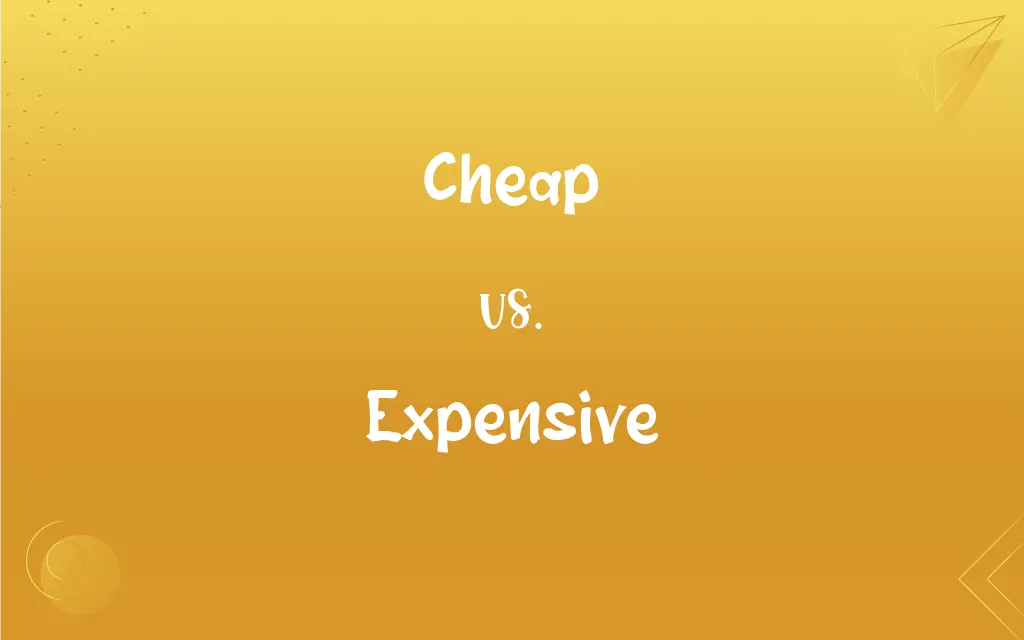Cheap vs. Expensive: What's the Difference?
Edited by Aimie Carlson || By Janet White || Published on January 21, 2024
Cheap refers to low in price, often suggesting lower quality or value. Expensive refers to high in price, often implying higher quality or value.

Key Differences
Cheap items are priced low, making them more accessible but sometimes implying lesser quality or durability. Conversely, expensive items are priced high, often reflecting superior quality, brand value, or luxury status.
The perception of cheap can vary, sometimes seen as cost-effective or economical, but often associated with poor craftsmanship. Expensive items are perceived as premium or exclusive, but can be seen as overpriced or indulgent.
In marketing, cheap products are often targeted towards budget-conscious consumers, focusing on affordability. Expensive products cater to a market segment seeking luxury, quality, or unique features, justifying the higher cost.
The cheapness of an item doesn't always reflect its functional value; some cheap items can be surprisingly durable or useful. In contrast, some expensive items may carry a price that exceeds their practical utility, paying more for the brand or design.
The terms cheap and expensive are relative and can depend on individual perspectives of value, quality, and affordability. What is cheap for one might be expensive for another, based on personal financial status and priorities.
ADVERTISEMENT
Comparison Chart
Price
Low, affordable.
High, often reflecting luxury.
Quality
Often perceived as lower.
Generally associated with higher quality.
Target Market
Budget-conscious consumers.
Consumers seeking luxury or quality.
Perception
Economical, sometimes inferior.
Premium, exclusive.
Value
Functional value may exceed cost.
Price may exceed functional value.
ADVERTISEMENT
Cheap and Expensive Definitions
Cheap
Of little worth, poor quality.
The cheap toy broke within a day.
Expensive
Costing a lot of money.
Their vacation was very expensive.
Cheap
Charging low prices.
They went to a cheap restaurant.
Expensive
Involving high cost or sacrifice.
The project was expensive in terms of time.
Cheap
Achieved with little effort.
It was a cheap victory.
Expensive
Valuable, precious.
They shared an expensive moment.
Cheap
Inexpensive, low cost.
She found a cheap dress for the party.
Expensive
High in price.
She bought an expensive watch.
Cheap
Deserving of contempt.
That was a cheap trick.
Expensive
Having a high price or value.
He drives an expensive car.
Cheap
Relatively low in cost; inexpensive or comparatively inexpensive.
Expensive
Requiring a large expenditure; costly.
Cheap
Charging low prices
A cheap restaurant.
Expensive
Marked by high prices
Expensive stores.
Expensive
(obsolete) Given to expending a lot of money; profligate, lavish.
Expensive
Having a high price or cost.
Expensive
(computing) Taking a lot of system time or resources.
An unnecessarily expensive choice of algorithm
Expensive
Occasioning expense; calling for liberal outlay; costly; dear; liberal; as, expensive dress; an expensive house or family.
War is expensive, and peace desirable.
Expensive
Free in expending; very liberal; especially, in a bad sense: extravagant; lavish.
An active, expensive, indefatigable goodness.
The idle and expensive are dangerous.
Expensive
High in price or charging high prices;
Expensive clothes
An expensive shop
FAQs
Does expensive always mean better quality?
Generally, but not always.
What does cheap mean?
Priced low, possibly of lower quality.
Is buying cheap always economical?
Initially, but not if it lacks durability.
Can expensive items be a good investment?
Yes, if they have lasting value.
Why do people buy expensive brands?
For quality, status, or personal preference.
Can cheap also mean poor quality?
Yes, it often implies lesser quality.
Why are some items expensive?
Due to brand, quality, or exclusivity.
Can expensive items be overpriced?
Yes, especially for brand value.
What does expensive mean?
High in price, often high in quality.
Are cheap items less stylish?
Not necessarily; style varies by product.
Are cheap products always the better choice?
Not if quality is a priority.
Do expensive items have better warranties?
Often, but not always.
Can cheap items be unique?
Yes, price doesn’t always define uniqueness.
Is it worth paying more for expensive items?
It depends on the item's value to you.
Do expensive items last longer?
They can, but it's not a guarantee.
How do I decide between cheap and expensive?
Consider quality, need, and budget.
Is it better to save for expensive items?
It depends on your financial goals and needs.
Is it bad to buy cheap products?
No, if they meet your needs and budget.
Can cheap be high quality?
Yes, if the product offers good value for the price.
Are all luxury items expensive?
Typically, as they denote exclusivity.
About Author
Written by
Janet WhiteJanet White has been an esteemed writer and blogger for Difference Wiki. Holding a Master's degree in Science and Medical Journalism from the prestigious Boston University, she has consistently demonstrated her expertise and passion for her field. When she's not immersed in her work, Janet relishes her time exercising, delving into a good book, and cherishing moments with friends and family.
Edited by
Aimie CarlsonAimie Carlson, holding a master's degree in English literature, is a fervent English language enthusiast. She lends her writing talents to Difference Wiki, a prominent website that specializes in comparisons, offering readers insightful analyses that both captivate and inform.

































































